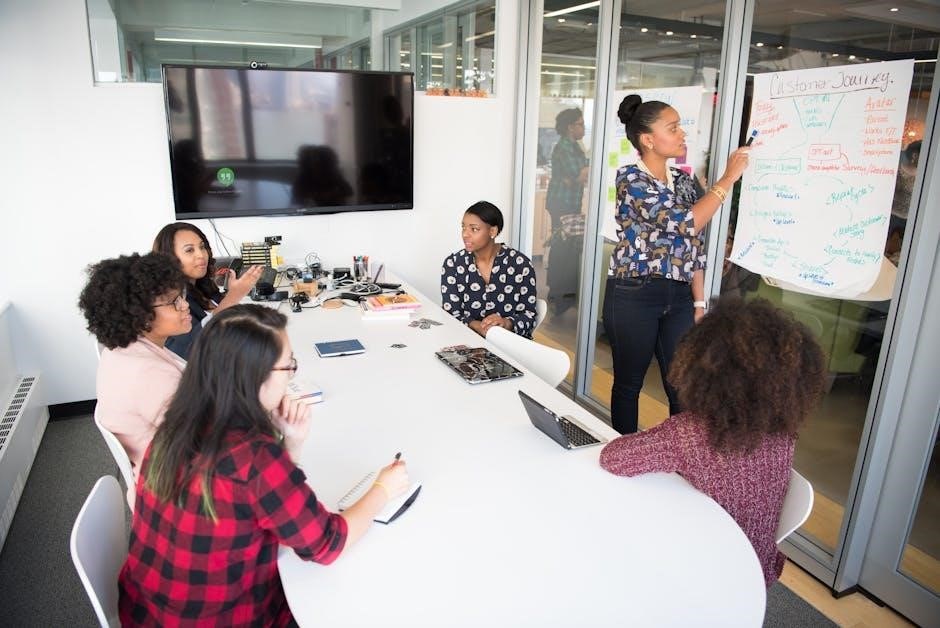Explore diverse themes for women’s conferences‚ including empowerment‚ leadership‚ health‚ and spirituality. Discover PDF resources‚ ministry ideas‚ and global perspectives shaping meaningful discussions for women worldwide.
Overview of Women’s Conferences
Women’s conferences serve as platforms for empowerment‚ education‚ and community building. They address diverse themes such as leadership‚ health‚ and spirituality‚ offering workshops‚ panels‚ and networking opportunities. These events inspire personal growth‚ foster connections‚ and provide resources for attendees. Conferences often feature expert speakers‚ interactive sessions‚ and practical tools to help women navigate challenges and achieve their goals. They also highlight global perspectives‚ cultural differences‚ and innovative solutions to pressing issues affecting women worldwide.
Importance of Women’s Conferences
Women’s conferences play a vital role in empowering individuals by addressing key issues like leadership‚ health‚ and economic empowerment. They provide platforms for education‚ networking‚ and personal growth‚ fostering connections and inspiration. These events highlight global perspectives‚ cultural differences‚ and innovative solutions to challenges faced by women. By featuring expert speakers and practical resources‚ conferences equip attendees with tools to navigate professional and personal landscapes effectively‚ promoting equality and advancement in various fields.
Key Themes in Women’s Conferences
Women’s conferences often focus on empowerment‚ leadership development‚ and health wellness. Themes include financial literacy‚ education‚ and career growth‚ as well as social issues like gender equality and discrimination. Spiritual growth‚ relationships‚ and community building are also emphasized. Global perspectives on women’s rights and cultural differences in empowerment are explored. These themes aim to inspire personal and professional growth while addressing challenges and fostering connections among attendees worldwide.

Empowering Women in Leadership
Conferences empower women to break gender barriers‚ fostering leadership skills and equality. Themes include executive roles‚ mentorship‚ and strategies for career advancement‚ inspiring women to lead confidently.
Leadership Development for Women
Leadership development programs focus on enhancing women’s skills‚ confidence‚ and influence in professional and community settings. Workshops‚ mentorship‚ and networking opportunities empower women to overcome challenges and embrace leadership roles. These initiatives foster gender equality‚ encouraging women to take charge and inspire change. By providing tools and support‚ leadership development programs help women thrive in diverse industries‚ creating a stronger‚ more inclusive future for all.
Breaking Gender Barriers in Leadership
Breaking gender barriers in leadership requires challenging stereotypes and biases that hinder women’s advancement. Strategies include promoting gender-neutral policies‚ encouraging diverse hiring practices‚ and addressing unconscious bias. Workshops and discussions at women’s conferences highlight the importance of creating inclusive environments where women can thrive. Empowering women to pursue leadership roles is essential for achieving equality and driving organizational success in a rapidly evolving world.
Women in Executive Roles
Women in executive roles face unique challenges‚ including underrepresentation in C-suite positions. According to recent data‚ only 8% of global CEOs are women. Breaking these barriers requires targeted mentorship‚ sponsorship‚ and policies that promote gender diversity. Women’s conferences often highlight success stories and strategies to overcome biases‚ fostering inclusive corporate cultures. Encouraging women to pursue executive roles is crucial for achieving gender parity and driving innovation in the workplace.

Women’s Health and Wellness
Women’s health and wellness focus on physical‚ mental‚ and reproductive well-being. Conferences emphasize the importance of access to care‚ education‚ and self-care practices‚ fostering healthier lifestyles.
Physical Health and Nutrition
Physical health and nutrition are vital for women’s overall well-being. Conferences highlight the importance of balanced diets‚ regular exercise‚ and proper hydration to prevent chronic diseases. Emphasizing whole foods‚ vitamins‚ and minerals helps maintain energy levels and supports long-term health. Discussions often include fitness routines‚ strength training‚ and the role of nutrition in mental clarity. Tailored advice for women at different life stages ensures personalized approaches to maintaining physical health and vitality.
Mental Health Awareness
Mental health awareness is crucial for women to manage stress‚ anxiety‚ and depression. Conferences emphasize self-care practices‚ mindfulness‚ and seeking support. Discussions focus on breaking stigmas‚ promoting emotional well-being‚ and fostering resilience. Workshops often include coping strategies‚ therapy options‚ and the importance of mental health in overall life balance. Encouraging open conversations helps women prioritize their mental health and build stronger‚ healthier lives.
Reproductive Health Education
Reproductive health education empowers women with knowledge on sexual health‚ family planning‚ and maternal care. Conferences highlight access to safe birth control‚ menstrual health‚ and prenatal services. Discussions address stigma around reproductive rights and provide resources for making informed decisions. Workshops often cover STD prevention‚ healthy relationships‚ and bodily autonomy‚ ensuring women have the tools to manage their reproductive well-being confidently and responsibly.

Financial Literacy and Economic Empowerment
Financial literacy equips women with tools to manage budgets‚ save‚ and invest‚ fostering economic independence and confidence in achieving long-term prosperity and stability.
Investing for Women
Investing empowers women to build wealth‚ ensuring financial security and independence. Tailored strategies help women navigate markets‚ assess risks‚ and diversify portfolios. Understanding investment vehicles like stocks‚ bonds‚ and ETFs is crucial. Women-focused investing often prioritizes long-term goals‚ such as retirement or education. By addressing unique financial challenges‚ investing enables women to achieve economic stability and create lasting legacies‚ fostering confidence in their financial futures.
Entrepreneurship and Small Business Management
Entrepreneurship offers women the freedom to pursue passions and create sustainable businesses. Conferences highlight strategies for startups‚ branding‚ and scaling ventures. Topics include securing funding‚ managing operations‚ and leveraging technology. Empowering women entrepreneurs fosters economic growth and independence. Workshops often focus on overcoming unique challenges‚ such as balancing family and business responsibilities. Building resilient businesses enables women to contribute meaningfully to their communities and economies‚ driving long-term success.
Financial Independence Strategies
Achieving financial independence is a cornerstone of women’s empowerment. Strategies include budgeting‚ saving‚ and investing wisely to build wealth. Managing debt and creating multiple income streams are emphasized. Conferences often discuss retirement planning and navigating financial setbacks. Empowering women to take control of their finances fosters confidence and stability‚ enabling them to thrive personally and professionally while making informed decisions about their economic futures.
Education and Career Advancement
Empowering women through education and career growth is vital. Conferences emphasize lifelong learning‚ skill development‚ and resources to help women advance professionally and achieve their goals successfully.
Education Opportunities for Women
Expanding access to quality education is crucial for women’s empowerment. Conferences highlight scholarships‚ vocational training‚ and mentorship programs tailored to women‚ fostering lifelong learning and skill development. They address barriers like financial constraints and societal expectations‚ promoting equity in education. Emphasizing STEM and leadership courses‚ these opportunities bridge gaps and empower women to pursue higher education and career advancement‚ driving personal and societal progress effectively.
Career Growth and Development
Women’s conferences emphasize the importance of career growth through networking‚ mentorship‚ and skill-building workshops. They provide strategies for overcoming workplace challenges‚ such as gender bias and pay gaps. Discussions focus on leadership development‚ salary negotiation‚ and creating a professional brand. These resources empower women to advance in their careers‚ break glass ceilings‚ and achieve fulfillment in their professional journeys while fostering inclusive and equitable workplaces.
Work-Life Balance Strategies
Women’s conferences highlight practical strategies for achieving work-life balance‚ including time management‚ boundary setting‚ and self-care practices; Discussions focus on integrating personal and professional responsibilities while maintaining mental and physical well-being. Emphasis is placed on leveraging technology‚ seeking support systems‚ and embracing flexibility in the workplace. These strategies empower women to prioritize their health‚ relationships‚ and personal goals‚ leading to a more fulfilling and balanced life.

Social and Political Issues
Women’s conferences address systemic inequalities‚ advocating for gender equality‚ and empowering women to challenge societal norms and political barriers. Key discussions include equal pay‚ representation‚ and policy reform.
Gender Equality and Advocacy
Globally‚ women’s conferences emphasize the importance of gender equality and advocacy. These events focus on challenging stereotypes‚ promoting equal opportunities‚ and addressing systemic biases. Key discussions include workplace fairness‚ equal pay‚ and representation in decision-making roles. Advocacy strategies are shared to empower women to challenge discrimination and promote inclusive policies. Education and resources are provided to equip women with tools to advocate for their rights and drive societal change effectively.
Women in Politics and Governance
Women’s conferences highlight the underrepresentation of women in political and governance roles. Discussions focus on barriers like gender bias‚ lack of mentorship‚ and societal expectations. Strategies to increase women’s participation include leadership training‚ policy reforms‚ and advocacy campaigns. Empowering women in governance ensures diverse perspectives and inclusive decision-making‚ leading to more equitable policies and stronger communities. These efforts aim to create a balanced political landscape.
Addressing Discrimination
Women’s conferences emphasize combating systemic discrimination through awareness and advocacy. Discussions focus on workplace bias‚ intersectional discrimination‚ and legal disparities. Strategies include policy reform‚ education‚ and fostering inclusive environments. Addressing discrimination ensures equal opportunities‚ promotes fairness‚ and empowers women to thrive. These efforts aim to dismantle barriers and create a society where diversity is valued and respected‚ fostering long-term social change and equality.

Relationships and Community Building
Fostering meaningful connections among women to build supportive networks‚ encouraging collaboration‚ and celebrating shared experiences to drive collective growth and positive change.
This section focuses on strengthening bonds and creating inclusive spaces for women to thrive together.
Building Strong Family Relationships
Strong family relationships are rooted in communication‚ mutual respect‚ and emotional support. Women play a pivotal role in nurturing these bonds‚ fostering a loving environment that promotes understanding and unity. Effective strategies include active listening‚ empathy‚ and setting healthy boundaries. Encouraging open dialogue and shared activities strengthens connections‚ while addressing conflicts constructively ensures harmony. Prioritizing quality time and positive reinforcement cultivates resilience and happiness within families‚ benefiting both individuals and society as a whole.
Creating Supportive Communities
Building supportive communities involves fostering collaboration‚ inclusivity‚ and shared goals. Women can empower each other by creating safe spaces for dialogue‚ mentorship‚ and mutual encouragement. By promoting diversity and addressing societal challenges‚ communities become stronger and more resilient. Encouraging collective efforts and shared vision helps women thrive personally and professionally‚ while fostering a culture of kindness and solidarity ensures long-term success and positive societal impact.
Networking Opportunities for Women
Networking opportunities for women are essential for fostering professional and personal connections. Conferences and workshops provide platforms for women to meet like-minded individuals‚ share experiences‚ and collaborate. Mentorship programs and interactive sessions further enhance these connections‚ empowering women to grow in their careers and businesses. Building strong networks helps women gain support‚ resources‚ and confidence to overcome challenges and achieve their goals in a competitive world.

Faith and Spirituality
Faith and spirituality serve as a foundation for inner strength‚ resilience‚ and purpose‚ guiding women to navigate life’s challenges with grace and compassion while fostering meaningful connections.
Spiritual Growth and Development
Spiritual growth and development empower women to deepen their faith‚ fostering a sense of purpose and inner peace. Through prayer‚ reflection‚ and community engagement‚ women can cultivate resilience‚ overcome challenges‚ and align their lives with their values. Workshops and discussions often focus on nurturing the soul‚ encouraging personal spiritual journeys‚ and creating spaces for healing and transformation. This focus helps women integrate their faith into daily life‚ inspiring hope and renewal.
Faith-Based Women’s Ministries
Faith-based women’s ministries focus on empowering women through spiritual guidance‚ community service‚ and leadership development. These ministries often include Bible studies‚ prayer groups‚ and outreach programs tailored to address women’s unique challenges. By fostering a supportive environment‚ they inspire women to embrace their faith and serve others. Such ministries play a vital role in nurturing spiritual strength and promoting unity among women of shared beliefs.
Christian Women’s Conference Themes
Christian women’s conference themes often center on faith‚ discipleship‚ and spiritual growth. Topics include prayer‚ Bible study‚ and living a purpose-driven life. Workshops may focus on balancing faith with daily responsibilities‚ fostering meaningful relationships‚ and overcoming life’s challenges through God’s grace. These events aim to inspire women to deepen their walk with Christ‚ embrace their roles in ministry‚ and live out their faith in transformative ways.

Technology and Innovation
Technology and innovation empower women through digital advancements‚ fostering equality and opportunities. They enable women to thrive in STEM‚ entrepreneurship‚ and create transformative solutions for global challenges.
Women in STEM Fields
Women in STEM fields face unique challenges but also opportunities for growth. Encouraging representation in science‚ technology‚ engineering‚ and math is crucial for innovation. Conferences highlight achievements‚ foster mentorship‚ and address barriers like gender bias. Promoting STEM education and career pathways empowers women to break stereotypes and contribute to groundbreaking advancements‚ driving progress in industries and inspiring future generations to pursue these fields with confidence and determination.
Digital Literacy for Women
Digital literacy empowers women to navigate and utilize technology effectively‚ enhancing their personal and professional lives. It bridges the gender gap in tech‚ fostering inclusivity and economic opportunities. Conferences emphasize skills like online safety‚ digital tools‚ and entrepreneurship. By promoting digital education‚ women gain confidence to thrive in a tech-driven world‚ accessing resources and networks that support their growth and independence in an increasingly connected society.
Innovative Solutions for Women
Innovative solutions for women focus on addressing unique challenges through technology‚ education‚ and entrepreneurship. Conferences highlight tools like mobile apps for healthcare access‚ platforms for skill development‚ and initiatives promoting financial inclusion. These solutions empower women to overcome barriers‚ fostering equality and economic growth. By leveraging creativity and technology‚ innovative approaches create sustainable opportunities‚ enabling women to thrive in various aspects of life and contribute to societal progress effectively.
Women’s Safety and Security
Women’s safety and security are critical issues addressed through awareness programs‚ legal reforms‚ and community support. Ensuring safe environments empowers women to live confidently‚ free from threats and discrimination‚ fostering a secure and inclusive society.
Domestic Violence Awareness
Domestic violence awareness is vital for empowering women to recognize and escape abusive relationships. Education and advocacy play a key role in prevention‚ while support systems provide safety and resources. Raising awareness helps reduce stigma and encourages survivors to seek help. Workshops and campaigns highlight warning signs and legal protections‚ fostering a supportive environment for healing and recovery.
Personal Safety Tips
Personal safety tips empower women to protect themselves in various situations. Trusting instincts‚ staying aware of surroundings‚ and carrying safety devices are essential. Sharing locations with trusted contacts and learning self-defense can enhance security. Setting boundaries‚ avoiding isolated areas‚ and keeping emergency numbers handy are critical. Educating oneself on safety strategies fosters confidence and reduces risks‚ ensuring women feel secure in their daily lives and environments.
Legal Rights for Women
Understanding legal rights is crucial for women’s empowerment. Laws protect women from discrimination‚ harassment‚ and violence‚ ensuring equality in education‚ employment‚ and property rights. Awareness campaigns highlight rights such as equal pay‚ maternity leave‚ and protection under domestic violence laws. Empowering women with legal knowledge enables them to advocate for justice and equality. Education and advocacy are key to ensuring women can exercise their rights confidently and effectively in all aspects of life.

Global Perspectives on Women’s Issues
Exploring global challenges‚ cultural differences‚ and regional progress in women’s rights‚ education‚ and healthcare. Understanding diverse experiences fosters collaboration and addresses global gender disparities effectively.
International Women’s Rights
Advocating for gender equality globally‚ international women’s rights focus on legal reforms‚ ending gender-based violence‚ and promoting women’s participation in decision-making. Global agreements like CEDAW and SDGs guide these efforts‚ ensuring women’s rights are protected and advanced worldwide. Collaborative initiatives by governments‚ NGOs‚ and international organizations like UN Women are crucial in addressing disparities and fostering inclusive societies. Cultural sensitivity and global cooperation are key to achieving equitable rights for all women.
Cultural Differences in Women’s Empowerment
Cultural differences significantly influence women’s empowerment‚ as societal norms and practices vary globally. While some cultures promote gender equality‚ others face challenges like restricted education and employment opportunities. Understanding these differences is crucial for creating tailored strategies to empower women within their unique cultural contexts. Grassroots initiatives and community engagement are essential to address local barriers and foster inclusive environments that respect cultural values while advancing gender equality.
Global Women’s Health Challenges
Global women’s health challenges vary widely‚ with access to healthcare‚ maternal mortality‚ and reproductive rights being critical issues; In developing regions‚ limited resources and cultural barriers exacerbate health disparities. Mental health stigma‚ inadequate nutrition‚ and infectious diseases further compound these challenges. Addressing these issues requires collaborative efforts‚ policy reforms‚ and community-based solutions to ensure equitable healthcare access and improve overall well-being for women worldwide.

Trends in Women’s Ministry
Modern women’s ministry emphasizes community engagement‚ leadership development‚ and technology integration‚ fostering spiritual growth and empowerment through inclusive‚ culturally relevant initiatives.
Modern Approaches to Women’s Ministry
Modern approaches to women’s ministry focus on inclusivity‚ diversity‚ and technology-driven engagement. These initiatives emphasize empowering women through leadership development‚ collaborative community efforts‚ and accessible resources. By leveraging digital platforms‚ ministries now reach broader audiences‚ fostering spiritual growth and addressing contemporary challenges. These strategies create spaces for open dialogue‚ equipping women to thrive in their faith journeys and societal roles effectively.
Engaging Young Women in Ministry
Engaging young women in ministry involves creating relatable content‚ fostering mentorship‚ and providing platforms for their voices. Peer-led discussions‚ social media integration‚ and relevant outreach programs help connect with their unique experiences. Encouraging leadership roles and highlighting their contributions empower them to actively participate. Tailored initiatives address their specific challenges‚ ensuring they feel valued and equipped to grow spiritually and socially within the ministry.
Future Directions for Women’s Ministry
Future directions for women’s ministry emphasize technology integration‚ fostering online engagement‚ and creating inclusive digital communities. Ministries are adapting to meet diverse cultural needs‚ prioritizing advocacy for gender equality‚ and investing in leadership development programs. Collaborative efforts with global organizations aim to amplify women’s voices and address contemporary challenges. These strategies ensure ministries remain relevant and impactful in a rapidly changing world.
